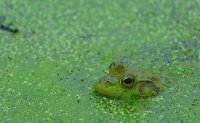| Description | Participants | Agenda | Videos |
|---|
NIMBioS Investigative Workshop
Stoichiometric Ecotoxicology

Topic: Modeling Ecotoxicological Dynamics Subject to Stoichiometric Constraints
Meeting dates: January 17-19, 2018
Location: NIMBioS at the University of Tennessee, Knoxville
Organizers:
Angela Peace, Mathematics and Statistics, Texas Tech Univ.
Paul Frost, Biology, Trent Univ.
Objectives: Accurately assessing the risks of contaminants requires more than an understanding of the effects of contaminants on individual organisms, but requires further understanding of complex ecological interactions, elemental cycling, and interactive effects of natural and contaminant stressors. There is increasing evidence that organisms experience interactive effects of contaminant stressors and food conditions, such as resource stoichiometry and nutrient availability. The development of ecotoxicological models over the last few decades have significantly contributed to interpreting how contaminants impact organisms and cycle through food webs. Existing modeling efforts take a variety of approaches to predict the effects of diverse chemical contaminants on organismal growth and survival; however, current models do not consider dynamical interactive effects of contaminant stressors and stoichiometric constraints, such as nutrient/light availability and food quality. This investigative workshop provided a forum for discussions of incorporating multiple essential elements and contaminants in ecotoxicological models. Discussions and breakout sessions throughout the workshop shed light on nutrient and chemical contaminant cycling with the aim of helping to improve toxicological risk assessment protocols. The objectives for the workshop included:
- Discussing the importance of linking Ecological Stoichiometry with Ecotoxicology and summarizing the current state of the synthesis of these two theories
- Formulating a series of empirically testable and robust models of individual and population dynamics subject to stoichiometric constraints and contaminant stressors
- Identifying future directions for models to be used in practice for ecological risk assessments and determining areas where empirical data are lacking in order to parameterize, test, and improve the models
Stoichiometric Ecotoxicology WordPress site
Presentations were available for viewing via live streaming during the workshop. .

NIMBioS Investigative Workshops focus on broad topics or a set of related topics, summarizing/synthesizing the state of the art and identifying future directions. Workshops have up to 35 participants. Organizers and key invited researchers make up half the participants; the remaining participants are filled through open application from the scientific community. Open applicants selected to attend are notified by NIMBioS within two weeks of the application deadline. Investigative Workshops have the potential for leading to one or more future Working Groups. Individuals with a strong interest in the topic, including post-docs and graduate students, are encouraged to apply. If needed, NIMBioS can provide support (travel, meals, lodging) for Workshop attendees, whether from a non-profit or for-profit organization.
A goal of NIMBioS is to enhance the cadre of researchers capable of interdisciplinary efforts across mathematics and biology. As part of this goal, NIMBioS is committed to promoting diversity in all its activities. Diversity is considered in all its aspects, social and scientific, including gender, ethnicity, scientific field, career stage, geography and type of home institution. Questions regarding diversity issues should be directed to diversity@nimbios.org. You can read more about our Diversity Plan on our NIMBioS Policies web page. The NIMBioS building is fully handicapped accessible.
NIMBioS
1122 Volunteer Blvd., Suite 106
University of Tennessee
Knoxville,
TN 37996-3410
PH: (865) 974-9334
FAX: (865) 974-9461
Contact NIMBioS


